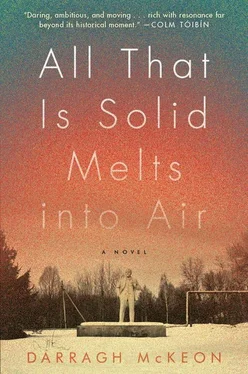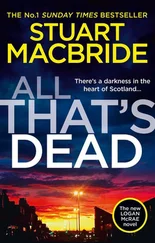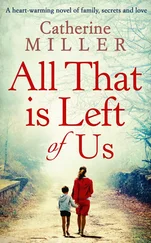It was a man older than his father, but not quite elderly. A comfortable, lined face, grey hair streaming from under a knitted black hat.
“You came on the buses last night?”
Artyom made to reply but held himself back, left space for his mother.
“Yes,” she said.
The man picked up two shovels near the door, put on a pair of gloves that hung by the hook.
“You’ll need to get food. There’s a truck coming to pick me up. I know where the shelter is.”
They stood and dusted themselves off. Sofya slapped her face to wake herself.
“I’m Maksim Vissarionovich.”
“Tatiana Aleksandrovna. These are my children, Artyom and Sofya.”
“Were you cold?”
“No. Yes. We used some things. I’m sorry.”
Artyom’s mother realized she was wearing the man’s coat. She began to take it off.
“Please. It stinks, I’m sorry. The sun hasn’t come up yet. Wear it until you get there.”
“Thank you, Maksim Vissarionovich.”
“Just Maksim. You slept in my coat, you know me well enough.”
The man had great, sweeping eyebrows as unruly as his hair.
“Then please call me Tanya.”
“Of course.”
Artyom rolled up the undercarpet, and Maksim pointed to their sacks of belongings.
“These are yours?”
“Yes,” Artyom replied, and Maksim grabbed all three in one hand and dipped and hefted them over his shoulder with a neat turn, and Artyom noticed the man’s wrists, the impressive width of them.
Artyom placed the undercarpet back with the other rolls.
“No, bring it.”
Artyom pointed to the roll, questioning, and Maksim repeated himself.
“Bring it. You might need it.”
A truck pulled up outside, a shrill whistle beckoning them out. A flatbed truck carrying five men, a shallow metal tub in their centre in which a fire burned, with logs sticking out and sparks crackling.
“We’ve a stop to make first,” Maksim said to the men, and then climbed in front with the driver, an anonymous figure hunched over the wheel.
Another vehicle. Another journey to somewhere. Artyom spread his hands in front of the fire and warmed them. The morning wasn’t so cold, and he suspected the men kept the fire out of habit, a luxury they afforded themselves to compensate for the early rise.
“You’re from the buses,” one of the men said.
“Yes,” Artyom’s mother replied.
“Have you come far?”
“From Gomel.”
“Far enough then.”
“Yes. I suppose.”
As the wood burned, lit splinters and sparks caught the trailing air and tailed behind them, darting and crackling in their wake.
Artyom could see his mother was running questions through her head. She looked upwards and chewed the inside of her lip, then addressed the men.
“People were wary of us last night. Can you tell us what you’ve heard?”
The one who replied had a face of dark stubble with a dusting of white tracing the line of his chin.
“I hear there’s militia guarding the hospitals.”
“Why would they do that?”
“They say that people are coming to the hospitals poisoned. They’re worried about it spreading.”
“Like a plague?”
“It’s just loose talk.”
“Are you not worried to have us share your truck with you?”
He looked around to his comrades. They were men of understatement. They pressed their bottom lips upwards, shaking their heads. One of the men spat into the fire, but the gob didn’t reach, hitting the side of the tub, where it sizzled and collapsed into a drip of brown sap. The man with the white chin had a bunch of keys, which he turned on his finger, the metal ringing as they flopped forwards and back.
“If you’re poisonous, why do they bring you to the city? To all of us? If you’re poisonous, they’d keep you out there, where there’s no people. You don’t look poisonous to me. You just look lost.”
“We feel lost.”
He directed his look to Artyom. “You know what we do?”
Artyom couldn’t answer. He had just accepted the fact that they were on their way to work.
“You collect rubbish,” Sofya piped in.
“That’s right.”
He turned and directed his conversation to her.
“You’d be surprised the things we pick up. Last week Pyotr here found a radio. You can’t tune it in but it crackles. So he brought it home and played it for the mice. They haven’t come back yet. That right, Pyotr?”
Pyotr smiled a mangled grin at Sofya. “I’ll keep it till someone throws out a cat.”
Sofya smiled back, equal to the man’s warmth.
“People get rid of things they don’t need. It doesn’t mean that they don’t have value, though. You just need to adapt them to a different use.”
He stopped twirling the keys and poked one of the logs further into the fire, causing a brief blaze of sparks that disappeared into their clothing.
“You’ll be fine. You’ll go home or you’ll adapt.”
“Thank you,” Artyom’s mother said.
“I’m just saying what I know.”
A pause.
“Where do you take it all?” Artyom asked. They didn’t have anyone to collect their rubbish at home. If they didn’t need something they burned it. There must be a big fire somewhere.
“To the dump.”
“You don’t burn it?”
The man looked surprised. “No. We don’t burn it. We pile it up.”
“And then what do you do?”
The rest of the men laughed at the question, but the man with the milky chin took it in and thought about it.
“We put more on top of it.”
“So it’s where things end up?”
“Yes. I suppose so.”
Another man said, “It’s where we’ve ended up,” and they laughed again.
They arrived at a warehouse on the outskirts of the city, a long, squat building surrounded by other long, squat buildings. The men helped them disembark, carrying the sacks and the roll of undercarpet. Artyom’s mother took off Maksim’s jacket and handed it to him, and he refused it but she was insistent, an immovable stubbornness in her voice, so he took it and she shook his hand and they called out their thanks to the men on the truck, each of whom responded with an open hand, covered by a ragged glove, and the truck disappeared into the morning, the suspension wheezing in the distance.
On the ground were the imprints of thousands of feet, leading from everywhere, merging into a muddy route to the entrance.
Artyom’s mother announced their arrival to the guards and they asked where she was from and heard their names, but they were just obeying routine, they had no lists to cross off and just nodded towards the door.
There were no queues in the warehouse; everyone had been registered during the night. All they could see were people laid out in their minute homes. Every family had a couple of square metres of carpet, cordoned off by drooping pieces of cardboard that had been taped to the floor. Thousands of small lives compacted together. Artyom recalled lifting a large stone and seeing a swarm of insects crawling underneath. This was what a city would look like if you took away all the walls and furniture.
Nearly everyone was sleeping. There were only a few people moving about, so few that it seemed odd to look at a vertical figure, someone standing or walking: seeing this many people stretched out gave the illusion that humans were built to exist on a horizontal plane. Odd, too, to see so many people exist in silence after the chaotic noise of the previous day.
Pigeons flapped overhead, darting their heads to take in every aspect of the place.
A woman wearing a yellow sash approached them. They could tell from her face that the smell from Maksim’s jacket still lingered. The woman spoke to them with distaste.
Читать дальше












